Related Research Articles
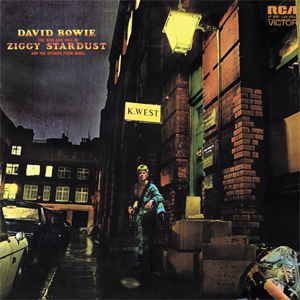
The Rise and Fall of Ziggy Stardust and the Spiders from Mars is the fifth studio album by English musician David Bowie, released on 16 June 1972 in the United Kingdom through RCA Records. It was co-produced by Bowie and Ken Scott and features Bowie's backing band the Spiders from Mars, composed of Mick Ronson, Trevor Bolder, and Mick Woodmansey. Most of the songs were written about the same time that Bowie's previous album Hunky Dory (1971) was written. After Hunky Dory was completed, recording for Ziggy Stardust began in November 1971 at Trident Studios in London; further sessions were held in early February 1972.

Mott the Hoople were an English rock band formed in Herefordshire. Originally known as the Doc Thomas Group, the group changed their name after signing with Island Records in 1969. The band released albums throughout the early 1970s but failed to find commercial success. On the verge of breaking up, the band was encouraged by David Bowie to stay together. Bowie wrote the glam rock song "All the Young Dudes" for them, which became a huge commercial success in 1972. Bowie subsequently produced an album of the same name for them, which continued their success.
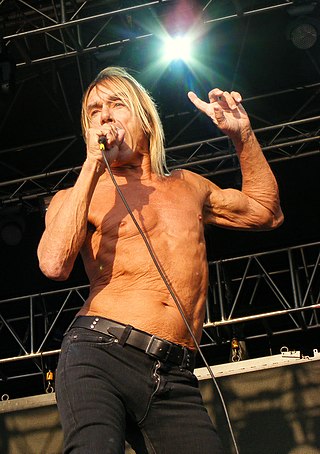
James Newell Osterberg Jr., known professionally as Iggy Pop, is an American singer, musician, radio broadcaster, songwriter and actor. Called the "Godfather of Punk", he was the vocalist and lyricist of proto-punk band The Stooges, who were formed in 1967 and have disbanded and reunited many times since.

James Edward Burton is an American guitarist. A member of the Rock and Roll Hall of Fame since 2001, Burton has also been recognized by the Rockabilly Hall of Fame and the Musicians Hall of Fame and Museum. Critic Mark Deming writes that "Burton has a well-deserved reputation as one of the finest guitar pickers in either country or rock ... Burton is one of the best guitar players to ever touch a fretboard." He is ranked number 19 in Rolling Stone list of 100 Greatest Guitarists.
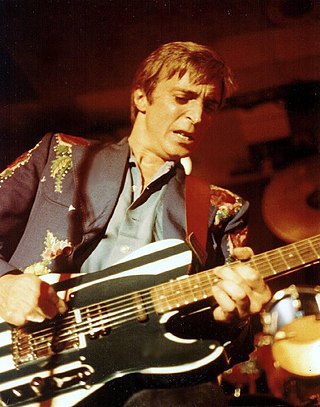
Michael Ronson was an English musician, songwriter, arranger, and producer. He achieved critical and commercial success working with David Bowie as the guitarist of the Spiders from Mars. He was a session musician who recorded five studio albums with Bowie followed by four with Ian Hunter, and also worked as a sideman in touring bands with Van Morrison and Bob Dylan.

Aladdin Sane is the sixth studio album by English musician David Bowie, released on 20 April 1973 through RCA Records. The follow-up to his breakthrough The Rise and Fall of Ziggy Stardust and the Spiders from Mars (1972), it was the first album he wrote and released from a position of stardom. It was produced by Bowie and Ken Scott and features contributions from Bowie's backing band the Spiders from Mars — Mick Ronson, Trevor Bolder and Mick Woodmansey — as well as pianist Mike Garson, two saxophonists and three backing vocalists. Recorded at Trident Studios in London and RCA Studios in New York City between legs of the Ziggy Stardust Tour, the record was Bowie's final album with the full Spiders lineup.

Slowdive are a British rock band that formed in Reading, Berkshire, in 1989. The band consists of Rachel Goswell on vocals and guitar, Neil Halstead on vocals and guitar, Christian Savill on guitar, Nick Chaplin on bass and Simon Scott on drums, all of whom have played on the band's debut Just for a Day in 1991. Halstead is the band's primary songwriter.

Diamond Dogs is the eighth studio album by English musician David Bowie, released on 24 May 1974 through RCA Records. Bowie produced the album and recorded it in early 1974 at Olympic and Island Studios in London and Ludolph Studios in the Netherlands, following the disbanding of his backing band the Spiders from Mars and the departure of producer Ken Scott. The absence of Mick Ronson led Bowie to play guitar on the record. The album featured the return of Tony Visconti, who had not worked with Bowie for four years; the two would collaborate for the rest of the decade. Musically, it was Bowie's final album in the glam rock genre, though some songs were influenced by funk and soul music, which Bowie embraced on his next album, Young Americans (1975).

"Fame" is a song recorded by English singer-songwriter David Bowie. It was released on his 1975 album Young Americans and was later issued as the album's second single by RCA Records in June 1975. Written by Bowie, Carlos Alomar and John Lennon, it was recorded at Electric Lady Studios in New York City in January 1975. It is a funk rock song that represents Bowie's dissatisfaction with the troubles of fame and stardom.

David Live is the first official live album by English musician David Bowie, originally released through RCA Records in 1974. The album was recorded in July of that year, on the initial leg of Bowie's Diamond Dogs Tour, at the Tower Theater in Upper Darby, Pennsylvania, a suburb of Philadelphia. The second leg, a more soul-oriented affair following recording sessions in Philadelphia for the bulk of Young Americans, would be renamed 'the Soul tour', as reflected on the live releases, Cracked Actor (2017) and I'm Only Dancing (2020).

"Ziggy Stardust" is a song written by English singer-songwriter David Bowie for his 1972 concept album The Rise and Fall of Ziggy Stardust and the Spiders from Mars. Co-produced by Bowie and Ken Scott, he recorded it at Trident Studios in London in November 1971 with his backing band the Spiders from Mars—comprising Mick Ronson, Trevor Bolder and Mick Woodmansey. Lyrically, the song is about Ziggy Stardust, a bisexual alien rock star who acts as a messenger for extraterrestrial beings. The character was influenced by English singer Vince Taylor, as well as the Legendary Stardust Cowboy and Kansai Yamamoto. Although Ziggy is introduced earlier on the album, this song is its centrepiece, presenting the rise and fall of the star in a very human-like manner. Musically, it is a glam rock song, like its parent album, and is based around a Ronson guitar riff.
"Panic in Detroit" is a song written by English singer-songwriter David Bowie for the album Aladdin Sane in 1973. Bowie based it on friend Iggy Pop's descriptions of revolutionaries he had known in Michigan and Pop's experiences during the 1967 Detroit riots. Rolling Stone magazine called the track "a paranoid descendant of the Motor City's earlier masterpiece, Martha and the Vandellas' "Nowhere to Run"".

Ziggy Stardust and the Spiders from Mars is a 1979 documentary and concert film by D. A. Pennebaker. It features English singer-songwriter David Bowie and his backing group the Spiders from Mars performing at the Hammersmith Odeon in London on 3 July 1973. At this show, Bowie made the sudden surprise announcement that the show would be "the last show that we'll ever do", later understood to mean that he was retiring his Ziggy Stardust persona.

Roy Babbington is a rock and jazz bassist. He became well known for being a member of the Canterbury scene progressive rock band Soft Machine.

Robert Gordon was an American rockabilly singer.
Charles Thomas Sean Mayes was a British pianist and writer.
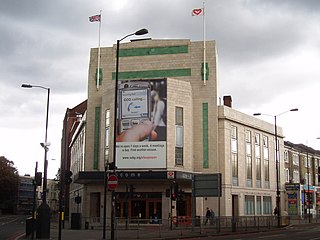
The Rainbow Theatre, originally known as the Finsbury Park Astoria, is a Grade II*-listed building in Finsbury Park, London. The theatre was built in 1930 as a cinema. It later became a music venue. Today, the building is used by the Universal Church of the Kingdom of God, an Evangelical church.
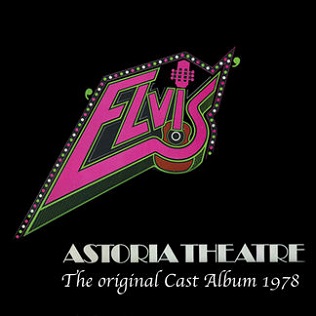
Elvis is a jukebox musical based upon the life of American singer Elvis Presley, conceived by and Ray Cooney and Jack Good. It tells the story of Elvis's life and career, from the beginning until his death. The original cast included Shakin' Stevens, who later became the top-selling UK singles artist of the 1980s and Tracey Ullman.
References
- ↑ "SecondHandSongs database artist: Fumble". secondhandsongs.com. Retrieved 13 December 2009.
- ↑ "Bowie wants Fumble", New Musical Express , 1973-02-06.
- ↑ Cann, Kevin (1983). David Bowie: A Chronology. Vermilion. p. 104. ISBN 0-09-153831-9.
- ↑ Buckley, David (1999). Strange Fascination - David Bowie: The Definitive Story. p. 336. ISBN 1-85227-784-X.
- ↑ "Groups and artists that have played at the Reading Festival 1973". readingmuseum.org.uk. Archived from the original on 16 July 2007. Retrieved 17 December 2009.
- ↑ "Roskilde Festival 1973". songkick.com. Retrieved 14 December 2009.
- ↑ Hammond, Ray. "Fumble's High School Hop", p.22. Sounds , 1973-07-14.
- ↑ "Band website: press articles". fumbleontheweb.com. Retrieved 17 December 2009.
- ↑ "Hipgnosis album art". hipgnosiscovers.com. Retrieved 17 December 2009.
- ↑ "Elvis 1977-1979 Astoria Theatre, London". forevershaky.co.uk. Archived from the original on 26 February 2009. Retrieved 15 December 2009.
- ↑ Simmonds, Jeremy (2008). The Encyclopedia of Dead Rock Stars: Heroin, Handguns, and Ham Sandwiches. Chicago Review Press. p. 344. ISBN 1-55652-754-3.